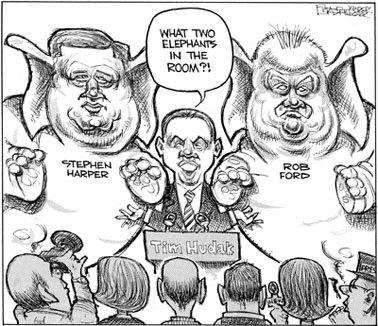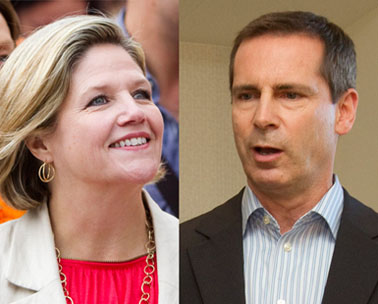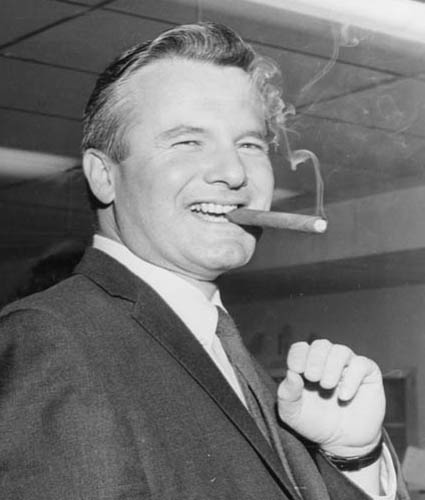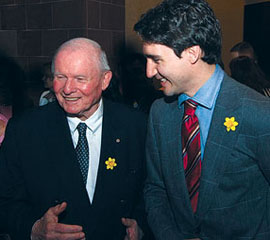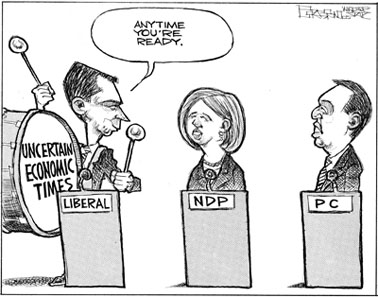“No accord, no coalition, no entente, no agreement – formal or informal – or any other linkage of any kind”????
Oct 3rd, 2011 | By Randall White | Category: In Brief
In the old imperial metropolis of London, England (that Stephen Harper loves so much?) they don’t agree with Rob Ford in Toronto or Tim Hudak in Ontario about cars!
Prince Edward Island and the Northwest Territories are voting today. The people of Ontario have to wait until Thursday.
But according to the Toronto Star yesterday: “Liberal Leader Dalton McGuinty is ruling out any possible arrangement with another party to remain in power after Thursday’s election … With polls suggesting Ontarians are poised to vote for a minority government for the first time in decades, McGuinty moved on Sunday to quash suggestions the Liberals hope to make a deal with the NDP to stay in office … ‘No accord, no coalition, no entente, no agreement – formal or informal – or any other linkage of any kind,’ he told reporters …”
As the Star also notes, there is much to suggest that we the people of Ontario will finally be electing a minority government of some description. And less than 24 hours ago, the long-experienced Geoffrey Stevens wrote in the Kitchener-Waterloo Record: “I’d guess something fewer than 50 Liberals – enough for a minority government in alliance or coalition with the NDP. The weaker the Liberals, of course, the stronger the NDP would be in the government.”
So what, you might ask, is Premier Dad doing when he says so firmly “No accord, no coalition, no entente,” etc. Is he just cutting off his nose to spite his face, in a high election fever? Or has he just been spooked by Tim Hudak’s panicky last-minute reprise of the know-nothing Harperite federal campaign against “coalitions” this past spring?
Is Premier Dad just losing his touch in the campaign’s last days?
To start with, no doubt, Mr. McGuinty might just be very confident that he (and not Tim Hudak or Ms. Horwath) is going to wind up with a majority government of some sort, however razor-thin. As the Star has reported on this front: “When pressed on whether he has even considered a minority, which a Toronto Star-Angus Reid poll suggested Saturday, McGuinty wouldn’t even acknowledge that possibility, saying ‘We won’t have to worry about that.’”
There is in fact some support for this position in some current polling data. An EKOS survey out just today suggests (in province-wide round-number percentages): Liberals 38%, Conservatives 31%, and New Democrats 23%. And Eric Grenier’s latest “weighted aggregation of the most recent polls” is once again suggesting a razor-thin Liberal majority of 55 seats – which would still allow for a Liberal speaker and a bare majority of 54 partisan votes in the 107-seat Legislative Assembly of Ontario.
At the same time, yet again, the latest Nanos poll shows only 35.6% of the province-wide vote for the McGuinty Grits, versus 36.4% for the Hudak Tories. And on some calculations, these numbers certainly do “raise the prospect of a minority government, with the NDP holding the balance of power.”
It may be true enough that the higher seat-generating efficiency of the province-wide Liberal vote implies a Liberal rather than a Conservative minority. But a minority government is a minority government, and to make it work you need to co-operate with someone. Isn’t Premier Dad, you might ask, being uncharacteristically cavalier and risky (just not prudent in the Old Ontario tradition, etc) in dismissing this prospect out of hand?
My own first subjective instinct is to say Yes indeed! And shame on you Mr. Premier. Like many others, I believe that some form of co-operation between Liberals and New Democrats (or vice-versa) will likely prove an important key to progressive public policy in many parts of Canada over the next number of years. I am disappointed to see Dalton McGuinty refuse to help push this kind of co-operation ahead a few more yards – in Canada’s most populous province.
On a second more objective assessment (having let the matter sit overnight and so forth), I can dimly see a more real-world-of-politics explanation. I don’t quite like it myself, but after some reflection at least I can see how it might very well appeal to Premier Dad, who is necessarily first and foremost concerned with his own professional political career.
The two minority government models in modern Ontario political history
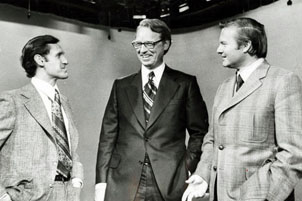
That 70s Show: Left to right – Ontario NDP leader Stephen Lewis, Liberal leader Bob Nixon, and PC leader Bill Davis. In 1975 Lewis and Nixon won a combined total of 73 seats, to Bill Davis’s 51. But Davis carried on as premier all by himself – eventually until 1985!
Broadly speaking, in the modern Ontario political history that people as old as I am can remember first hand, there have been two rather different ways of managing minority governments. The first is the written Liberal-NDP Accord of 1985, which finally allowed provincial Liberal leader David Peterson to put an end to 42 consecutive years of Progressive Conservative rule – with some crucial help from then provincial NDP leader Bob Rae.
This quite formal agreement of 1985 between the Liberals and New Democrats is the most recent minority government formula in Ontario history, and its logical enough that it should be the one on our minds right now. Only a short time before this, however, Progressive Conservative Premier William Grenville Davis very successfully managed two successive minority governments – 1975—1977 and 1977—1981 – without any accord, coalition, entente, agreement – formal or informal – or any other linkage of any kind (to paraphrase Mr. McGuinty’s remarks to reporters yesterday).
It is, I think, widely recognized among those who ponder such things that the key to the Davis PC government’s survival 1975—1981 was the unwillingness of the then Liberal and New Democratic parties in the legislature to act together, to bring the government down and then provide some alternative. The Ontario Liberals of those days were still something of a rural rump from the late 19th and earlier 20th centuries. And the NDP was still quite deeply rooted in the earlier “Regina Manifesto” socialism of the old Co-operative Commonwealth Federation (CCF). Bland Bill Davis from Brampton got his minority legislation passed when he needed to, by leaning sometimes one way, and sometimes the other, etc, etc, etc.
We already know from Premier McGuinty’s remarks during the September 27 TV leaders’ debate that he holds the authentic Ontario progressive conservative William G. Davis in very high esteem. It now seems that he has also decided to follow the Davis model of managing minority governments (or try to at any rate), if a minority government finally is what we the people of Ontario wind up giving him this coming Thursday.
The calculation here would seem to be as well that the Hudak Conservatives and Horwath New Democrats of the early 21st century are no more (and perhaps even less?) likely to co-operate in the Legislative Assembly of Ontario than the old agrarian democratic Liberals and Regina Manifesto New Democrats of 1975—1981. And it at least seems hard to deny that this calculation just may turn out to be quite correct.
Personally, or subjectively as it were, I remain disappointed that Premier Dad is turning his back on the higher-minded prospect of pushing the concept of Liberal-New Democrat progressive co-operation on a broader front a little further down the field. But as an aspiring political realist I can also at least see how the old Bill Davis model of minority government management could be more to his liking (if not necessarily his ultimate success?). I can see too how it might help him deal with such headlines as: “Hudak raises alarms about possible Liberal-NDP deal” ; “Horwath poised to play kingmaker” ; and “Potential kingmaker Horwath outlines priorities.” (And, meanwhile back in the capital city, maybe calculations of this sort are even why Premier McGunity’s Liberals have now received editorial endorsements from both the Toronto Star and the Globe and Mail?)

